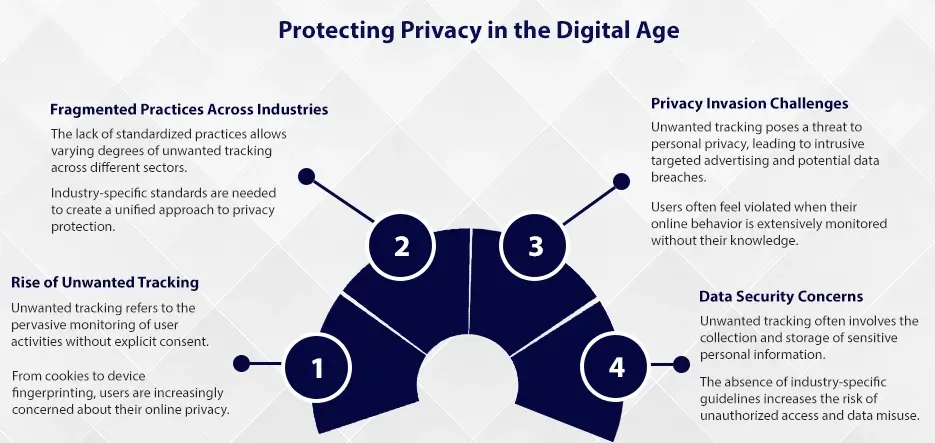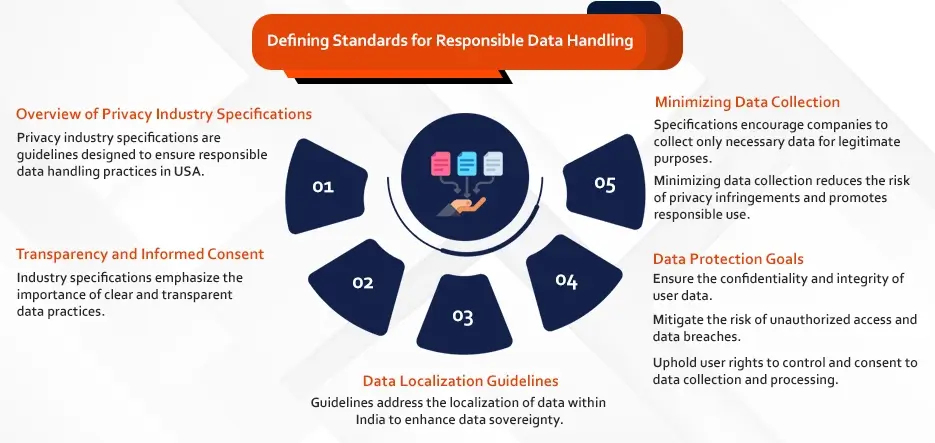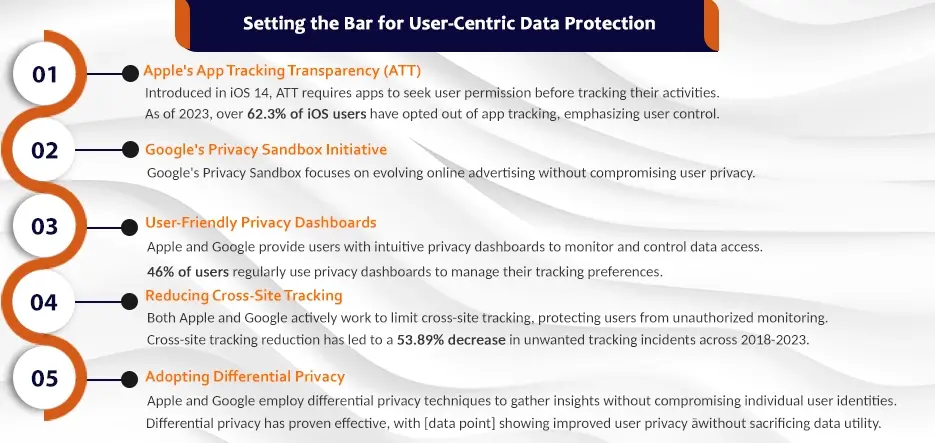Table of Contents
Costly data breaches. Ongoing security issues. Personalisation of online services. Intrusive advertising tactics. Sharing of consumer data and unwanted tracking. Consumers are raising warnings about how today’s businesses are utilizing and protecting their personal data and their interests are rapidly driving the issue of consumer data privacy up the boardroom agenda.
Apple and Google as of late unveiled refreshed policies that set forward comprehensive principles directing data assortment and usage across their platforms. These industry guidelines are strategically designed to curtail inappropriate tracking, fostering a computerized climate where development serves users’ interests as opposed to exploiting them. According to Pew Research Center, about 72% of Americans feel that almost all of their online or offline activities are being tracked by advertisers, technology firms, or other companies.
Apple’s introduction of the App Tracking Transparency (ATT) framework in iOS 14.5 is a crucial truth in this story. This framework mandates express user consent for app developers taking part in cross-app and cross-website tracking, rethinking user command over personal data. On the Google front, the rollout of Android 12 delivered significant developments. The Privacy Dashboard empowers Android users by offering insights into how apps access their data, enhancing transparency and better visibility into which apps have accessed their data by custom mobile application development company.
These policies by and large aim to give a framework that ensures oversight and guardrails for improvement inside the tech industry. Thus, these driving companies are effectively adding to a future where innovation advances responsibly and morally, focusing on user government assistance over manipulative practices.
Take Control of Your Online Privacy Now!
Apple’s Stance on Privacy
Apple has taken a strong stance on privacy with the introduction of its App Tracking Transparency (ATT) framework. Rolled out in iOS 14.5, ATT requires app developers to request express user consent before tracking their data across apps and websites for designated advertising. This move has shifted the power dynamic, placing users in charge of their data.
The ATT framework has sparked debates inside the advertising industry, with some contending that it might affect the effectiveness of personalized ads. In any case, Apple remains steadfast in its obligation to focus on user privacy over designated advertising income.
Google’s Privacy Measures
Similarly, Google has made progress in enhancing user privacy through updates to its Android working system. With the Android 12 release, Google presented a Privacy Dashboard, offering users insights into how apps are accessing their data. Furthermore, the organization has carried out indicators that advise users when an app is accessing their camera or microphone.
Google’s Privacy Dashboard serves as a transparency instrument, engaging users to settle on informed conclusions about which apps they permit to gather their data. This proactive approach aligns with the developing demand for increased transparency and command over personal data.
The Need for Industry Specification for Unwanted Tracking
Unwanted tracking of user data and conduct poses privacy concerns that demand attention through policy, legislation, and responsible practices. Nonetheless, general laws alone can’t solve complex data assortment and use issues. Regulations must be supplemented with enforceable standards created by experts inside specific industries.
Industries gathering and using a lot of user data are responsible for executing policies limiting unwanted tracking and ensuring transparency of practices. Self-regulation allows tailoring guidelines to invent custom app development services and technologies that develop quickly. The Electronic Frontier Foundation highlights that tracking technologies often exploit browser fingerprinting, a technique that collects information about users’ devices, making it challenging to maintain anonymity online.
Focused workgroups inside industries are best prepared to assess how data is accumulated and applied inside their sectors. Granular guidelines will further develop oversight and responsibility across divided companies, applications, devices and data sources.
Users can’t be aware of or control how their data travels between entities in sprawling advanced ecosystems. They should not need to explore mazes of obscure privacy policies to exercise central rights over their data. Requirements for limiting data usage, storage timeframes, sharing restrictions and quit options can bring lucidity while accessing services.
There is esteem in data that fuels advancement and progress when handled responsibly. Specifications limiting unwanted tracking wouldn’t block the benefits of educational capitalism however control excesses that compromise individual prosperity and trust in the system. Policies should aim to work with data-driven gains through transparent and consensual assortment and application of data.
In summary, wide laws and regulations alone are insufficient for addressing privacy concerns over unwanted tracking of user data. Industry-established guidelines are necessary to foster adjusted and tailored policies based on nuanced business models and technologies.

The Initiative Led by Apple and Google for Unwanted Tracking
Tech giants Apple and Google as of late declared plans to control unwanted tracking of user data and limit spread to outsiders. The initiative aims to strengthen privacy while empowering useful advertising and analytics applications. Changes will give more control, transparency, and restrictions on sharing data across apps and devices.
The move is a positive step towards responsibility, however, limitations are probably not going to satisfy advocates calling for stronger privacy laws and regulations. Policies created by companies also depend on trust in their judgment and altruism, despite business models relying on data and advertising. EFF’s Surveillance Self-Defense project emphasizes the prevalence of mobile tracking, revealing that mobile apps frequently contain trackers, exposing users to pervasive data collection.
Direction must strike a harmony between transparency, consent and development to be pretty and broadly embraced. Users need command over their data without surrendering the benefits of free services or capabilities rising up out of research. Policies must work with reasonable usage and limits, not prohibition. Transparency tools should illuminate choices instead of obscuring how data strengthens capabilities for many top mobile app development companies in USA.
Arguments against regulation disregard how market influences have failed to check excesses thus far. Deliberate policies alone won’t counter the motivation for companies to accumulate more data and screen more ways of behaving when more is increasingly possible and productive. Laws establishing guardrails and responsibility are possibly necessary to safeguard individuals from ruthless practices dishonestly. Nuanced policies require understanding the multi-layered issues, not philosophical extremes. The World Wide Web Foundation underscores the economic impact of personal data, stating that the data broker industry is estimated to be worth over $200 billion, fueled by the buying and selling of user information.
The Goals of the Industry Specification for Unwanted Tracking
Direction created by experts inside specific industries aims to establish adjusted and practical standards for limiting unwanted tracking of user data. Policies should work with transparency, responsibility and consent around the assortment and use of data while still empowering the development and benefits of data-driven technologies.
Specifications figure out what data is reasonably expected for services versus excessively assembled for speculation or surveillance. They would adjust oversight between divided companies, complex systems and advancing practices. Requirements around limiting storage timeframes, restricting sharing across entities, quitting options and requesting certifiable consent can engage users in complex computerized ecosystems.
The goals of industry specifications are not prohibition or dismantling of data-driven progress. They aim to work headway through ethics and trust instead of abuse. Policies should simplify illuminating choices instead of obscuring how data benefits companies and customers. Transparency tools increase understanding and consent, not exposure and weakness.
Standards establish guardrails empowering development to flourish inside responsibility and responsibility. They counter incentives for excessive assortment and observing when more data and surveillance are possible and productive. Specifications can ensure data strengthens society, not just through benefit or control. Policies should esteem data-enhancing lives, not just endeavour them for gain.
According to Mozilla Foundation Insights, the organization behind Firefox, stresses the importance of privacy in their annual Internet Health Report, citing the need for increased awareness and user control over tracking practices. They depend on adjusted, multi-stakeholder input as opposed to philosophical extremes. Policies must adjust significant privacy, ethics and consent with opportunities arising out of the data. Comprehensive solutions depend on facilitating benefit and limiting harm, not prohibition or ignorance.
Act Today for a More Secure Online Experience!
The Scope of the Industry Specification for Unwanted Tracking
Guidelines developed by industry experts aim to lay out functional principles restricting the unwanted assortment and utilization of client data across dissimilar custom app development services, technologies and administrations. Policies should have scope and adaptability to suit creative practices that advance quickly inside complex computerized biological systems.
Specifications determine reasonable data use for explicit purposes versus abundance gathering for theory or observation. They adjust oversight between divided organizations, applications, gadgets, data sources and sharing between elements. Requirements around transparency, assent, data minimization, reason limit and quit choices can enable users to explore labyrinth-like frameworks.
The scope of guidelines incorporates granular controls, reviews, certificates and punishments inspiring dependable practices. Self-guideline permits tailoring policies to diverse, advancing necessities inside enterprises. Reliable guidelines support ethical innovation while checking overabundances subverting trust or prosperity. Policies esteem progress benefiting all, not simply benefit or control.
Norms lay out balanced guardrails empowering progress to prosper inside the limits of responsibility. Flutter App Development Companies counter impetuses for overcollection and unnecessary checking conceivable with advancing technologies. Specifications guarantee data strengthens society, not simply through business abuse. Policies ought to work with benefit, not simply benefit or observation.
Guidelines develop nuanced, multi-stakeholder solutions thinking about complex connections between key stakeholders and progress. According to Digital Advertising Alliance (DAA) Statistics, the AdChoices program, aimed at providing users with transparency and control over personalized ads, has seen widespread adoption by advertisers and publishers, indicating industry acknowledgment of privacy concerns.
Policies balance significant privacy and oversight with potential open doors arising out of the data. Exhaustive progress relies upon working with benefits and restricting damage together.
The scope of industry specifications aims to secure and engage through governance, not destroying progress worldwide vital frameworks. Policies esteem inventive benefits and prosperity, not simply benefits.
The Industry Impact
As Apple and Google set new principles for unwanted tracking, the gradually expanding influences are felt across the computerized scene. Other tech organizations are constrained to rethink their data assortment practices to line up with advancing client assumptions. Privacy-driven highlights are turning into an upper hand, impacting customer choices and compelling organizations to focus on data security.
Be that as it may, not every person sees these progressions in a positive light. Publicists and advertisers are grappling with the developing scene, adjusting methodologies to follow these privacy measures while as yet conveying successful publicizing campaigns. The industry is at a junction, adjusting the requirement for customized encounters with the developing interest for privacy.

The Technical Details of the Industry Specification for Unwanted Tracking
Guidelines developed by industry experts determine reasonable data assortment and use versus abundance for technical policies. Requirements determine purposes and periods for putting away and sharing data while empowering fundamental applications. They characterize limits, assent choices and quit controls.
The American Civil Liberties Union (ACLU) advocates for stronger privacy protections, warning that unchecked tracking can lead to invasive profiling, impacting individuals’ civil liberties and freedoms. Specifications consider how data benefits administrations and users, not simply business double-dealing. Policies permit innovation to flourish through morals and partnership rather than unrestrained capacity. Technical details work with progress aligned with standards of transparency, assent and obligation rather than dismissing them.
Technical policies develop nuanced solutions offsetting significant privacy oversight with open doors energizing proceeded with headway. They depend on splitting the difference and integrated progress over analysis or denial. Requirements determine what data use is sensibly important versus unreasonably gathered or shared across complex frameworks and stakeholders. Technical guidelines influence aptitude laying out proportionate practices for diverse business models, technologies and reasonable use inside ventures. Policies can build up ethical innovation tailored to advancing requirements rather than one-size-fits-all commands. Reliable guidelines inspire mindful data to the board through transparency, choice and results rather than dismissal.
Technical specifications think about complex connections between organizations, users, data, administrations, applications, gadgets, and sharing mechanisms. They aim for balanced policies and oversight rather than absolutes or isolationism. Multi-stakeholder participation develops integrated solutions rather than siloed perspectives. Policies determine oversight, adjusting liability and capacity.
In general, technical guidelines develop balanced policies empowering both privacy oversight and progress. Best mobile app development company in USA lays out proportionate shields through transparency, assent, data minimization and responsibility rather than destroying universally fundamental frameworks and capacities.
The Role of Privacy in the Industry Specification for Unwanted Tracking
Industry principles aim to lay out balanced policies empowering oversight governance and progress rather than absolutism, double-dealing or destroying universally fundamental frameworks.
The Open Rights Group emphasizes the need for ethical data practices, arguing that current tracking methods can lead to the exploitation of user data for political or commercial purposes, necessitating regulatory intervention. Specifications determine reasonable data utilization aligned with transparency, assent and obligation standards rather than dismissing them. Policies esteem partnership, morals and the benefit of all rather than business interests. iOS App Design develops nuanced solutions considering complex connections rather than analysis or forbiddance. Policies offset significant privacy oversight with potential open doors filling proceeded with progression.
Guidelines lay out proportionate protections empowering innovation to flourish through trust and morals rather than dangers or dismissal for individual prosperity. Policies permit basic applications to benefit society rather than simply benefit. They indicate capacity limits, sharing limitations, quit controls and assent choices, enabling users to explore interconnected frameworks. Policies convey informed choice through partnership rather than lack of clarity, openness or manipulation. Transparency fabricates trust empowering sustainable progress.
Privacy aims to benefit through security and strengthening, not discipline. It would be ideal for governance to aim for just, inclusive and far-reaching benefits by help rather than abuse or control alone. Policies determine reasonable oversight adjusting liability and ability.
Progress relies upon balanced, nuanced solutions rather than a way of talking or limits alone. Requirements persuade capable data the board through outcomes and responsibility rather than dismiss. They think about complex connections between organizations, data, administrations, applications, gadgets, users and sharing mechanisms.
The Benefits of the Industry Specification for Users
Here are the critical benefits of industry specifications for users:
1. Empowered Choice
Requirements around transparency, assent choices, and quit controls educate users regarding how their data and data are utilized rather than lack of definition or manipulation.
2. Proportional Governance
Policies determine reasonable data use versus overabundance for explicit purposes rather than expansive reconnaissance or negligence of privacy. Guidelines lay out guardrails empowering innovation to progress inside ethical limits for Programming Languages for App Development.
3. Balanced Policy Solutions
Consider complex connections rather than analysis or preclusion alone. Multi-stakeholder input develops compromise empowering far-reaching progress rather than confined perspectives or outrageous positions. Policies set out freedom, oversight and privacy rather than forfeiting for others.
4. Trusted Partnership
Transparency assembles understanding and assent rather than doubt in frameworks users rely upon and esteem.
5. Inclusive Benefits Aim for Equity
Shared thriving and complete progress benefit the general public rather than benefit, governmental issues or restricted personal circumstances alone. There are shields against abuse, empowering open doors for diverse gatherings and networks, not simply business interests.
6. Reasonable Requirements
Specifications determine limits, capacity limitations, sharing constraints and controls, and adjusting liability and ability rather than absolutes alone. Policies permit basic applications to benefit users rather than dangers to utility, access or manipulation.
7. Multifaceted Solutions
Guidelines think about complex connections between organizations, data, administrations, applications, gadgets and sharing mechanisms. iOS app development companies aim for integrated governance rather than disengaged policymaking alone. Exhaustive solutions balance diverse needs rather than single issues.
8. Fair and Ethical Progress
Esteem partnership, uprightness, assent and shared benefit over manipulation, dangers, negligence or control alone. Progression relies upon principled approaches working with equity, consideration and complete prosperity as long as possible – not fast gains, legislative issues or benefit alone. Progress sustainable and ethical depends on balanced governance and nuanced policymaking rather than limits alone.

The Benefits of the Industry Specification for Businesses
Key benefits of industry specifications for businesses are as per the following:
1. Aligned Innovation
Policies determine reasonable oversight spurring moral progress aligned with privacy, trust and obligation standards. They lay out guardrails empowering progress with progression allowable within responsibility rather than dangers. Innovation flourishes through partnership rather than manipulation or negligence of impact.
2. Balanced Policy
Solutions consider complex connections between organizations, data, administrations and frameworks rather than isolationism. Multi-stakeholder input develops compromise empowering thorough progress rather than siloed perspectives.
3. Credible Oversight
Specifications spur mindful data on the executives through responsibility and outcomes of flippant practices rather than an absence of standards or constraints alone. They lay out what use is sensibly required versus unnecessarily gathered or shared. Policies consider how data benefits administrations and users, not simply business interests.
4. Multifaceted Governance Policies Determine Limits
Capacity limitations, sharing controls and assent choices, and giving organizations informed rehearses rather than ignoring privacy, obligation or trust. Far-reaching solutions balance different needs rather than diminishing innovation to a solitary issue.
5. Inclusive Benefit
Policies aim for equity, shared flourishing and thorough progress benefiting all general public rather than benefit, governmental issues or strength over other interests alone. There are shields against double dealing guaranteeing an amazing open door and benefits that stretch out to diverse gatherings, in addition to those with power or means.
6. Reasonable Requirements
Industry guidelines determine proportionate policies rather than absolutes or absence of oversight alone. There are constraints of what is sensibly expected to work administrations versus overabundance gathering conceivable with practically no guardrails. Policies permit basic applications to benefit the best mobile app development company in USA and users rather than manipulation, dangers or dismissal of impact.
The Future of Unwanted Tracking
Unwanted tracking keeps developing with propelling technology, requiring further developed governance. Industry specifications intend to lay out balanced policies empowering innovation and oversight together rather than dangers against privacy, responsibility or progress alone.
Nuanced solutions consider relationships between companies, information, services and systems rather than isolationism. Multi-stakeholder input creates compromise empowering comprehensive progress rather than single-issue absolutism. Policies balance opportunity and ethics rather than allowing excess or threatening innovation.
Policies lay out proportionate requirements rather than an absence of principles or absolutes. Necessities determine sensible information utilization lined up with responsibility rather than ignoring impact.
Nevertheless builds understanding through assent and consideration of how systems influence lives – not lack of definition, control or panic-based manipulation. Policies convey informed rehearsals rather than an absence of oversight. Android app development agency shapes governance by empowering benefits for all rather than catching assets for a couple alone.
The Center for Humane Technology, founded by former tech insiders, raises awareness about the psychological impact of continuous tracking, shedding light on the addictive design of certain online platforms and their effects on mental well-being. Guidelines hold back nothing and flourish, benefiting society rather than profit, legislative issues or control alone. Responsibility and outcomes persuade mindful innovation rather than an absence of core values. Policies consider how information and technology can benefit different gatherings, not simply business interests or people with significant influence alone.
Specifications determine adjusted innovation, empowering significant progress and moral oversight together – not dangers against ethics or progression. Policies lay out guardrails working with progression within capable limits rather than the shortfall of limitations empowering control alone. App’s Success on Apple Store and Google Play permits significant opportunities rather than forbidding innovation altogether or empowering its abuse.
The Role of Users in Addressing Unwanted Tracking
Users stand to benefit from and add to solutions addressing unwanted tracking. By understanding developing innovations, policies and their privileges, people can advocate for balanced governance, ensuring progress aligns with privacy principles, trust and responsibility.
Users can partake in creating nuanced, multifaceted policies considering complex relationships rather than specific issues alone. Multi-stakeholder collaboration finds compromise empowering innovation and oversight together rather than dangers against progress or privacy. Policies esteem association over ignoring prosperity and shared benefits over-double-dealing of information or trust.
Users make some noise about concerns with information collection, use and sharing to shape nuanced rather than absolutist solutions. They consider how services decidedly add to lives and possible abuse if ungoverned. By communicating viewpoints on benefits and dangers, users assist with deciding sensible imperatives, and adjusting capacity and ethics. Policies lay out guardrails empowering opportunity rather than denying progress altogether or empowering control alone.
Teaching others on issues like unwanted tracking and accessible solutions helps build understanding across society. When more individuals grasp related advances, policies and freedoms, it works with the organization over polarization and balances over dangers alone defining governance. Comprehensive progress depends on considering the impact on all rather than rhetoric or void commitments alone.
Users demand and carry out principles of privacy, assent and straightforwardness, bringing more moral practice. People can pursue informed decisions about information sharing and use by understanding how systems work and accessible controls like pick-outs or information access/erasure demands. Policies hold back nothing trust by considering the impact on lives rather than lack of definition, control or dread alone.
“Getting information from the Internet is like taking a drink from a hydrant.” – Personal Computing Pioneer and Investor Mitchell Kapor
Conclusion
However policies alone do not ensure just results, they address an urgent first step. As technology propels, companies laying out principles of privacy, organization and balance are expected to spur oversight, empowering benefit rather than weakness alone defining progress. When implemented and enforced equitably, guidelines from leaders in the industry can assist android app development companies with building a foundation of trust on which future progress depends.
Generally speaking, Apple App Store Statistics and Google driving how unwanted tracking through balanced rules gives the motivation to trust governance can determine limits by adjusting ethics and potential together rather than dangers against either alone defining the way forward.
Transform Your Software Vision into Reality – Book A 30 Minutes Free Consultation!
Frequently Asked Questions (FAQs)
What to do if an unwanted AirTag is tracking you?
- Find the AirTag using the Find My app on your iPhone, iPad or Mac and tap Play Sound to make it alert so you can find it.
- Hold down the AirTag for something like 10 seconds until the status indicator light begins blazing persistently. It impairs the AirTag and keeps it from tracking you further.
- Report unwanted tracking to nearby authorities like the police. They might utilize GPS information to determine who put the AirTag.
How might I at any point let know if an AirTag is tracking me?
- Check for obscure devices in the Find My app. AirTags will appear as “Things” with their specific ID number.
- Search for little devices connected to your possessions, vehicle or assets. AirTags are about the size of a coin with a metallic finish and a button on one side.
- If an obscure gadget is making a commotion like signalling or a ring, it could demonstrate an AirTag is tracking you. AirTags will play a sound to assist with finding them if they get lost.
How do AirTags work?
- AirTags use Bluetooth and ultra-wideband technology to follow the location of your possessions. They associate with Apple devices like iPhones, which determine the AirTag’s location relative to Wi-Fi and GPS locations.
- When an AirTag moves out of the Bluetooth scope of your devices, its location is determined using the locations of other close by iPhones. This publicly supported information assists build up the AirTag’s location after some time as more individuals with strolling by it.
How do I switch off tracking on my iPhone?
- Go to Settings → Privacy → Tracking and toggle off “Permit Apps to Demand to Track”. It forestalls third-party apps from tracking your location and movement across apps and sites.
- Go to Settings → Location Services and toggle off individual apps to keep them from getting to your location information. Or toggle off “Enable Location Services” to incapacitate location tracking on your iPhone.
- Go to Settings → General → Reset and tap “Reset Network Settings” to get out network information and prioritize right now accessible Wi-Fi networks over recently associated ones. It can assist with keeping obscure devices from getting to your network.
- Consider using a VPN or private browsing mode to hinder network tracking of your movement and location. Some free or paid VPN services can assist with forestalling unwanted monitoring.
- You can likewise utilize third-party apps that forestall tracking, however, they can’t ensure total namelessness. The most solid approach is restricting what information you share whenever conceivable.






